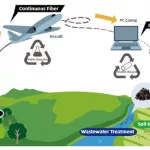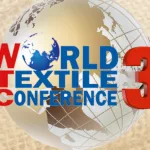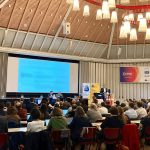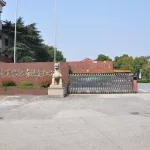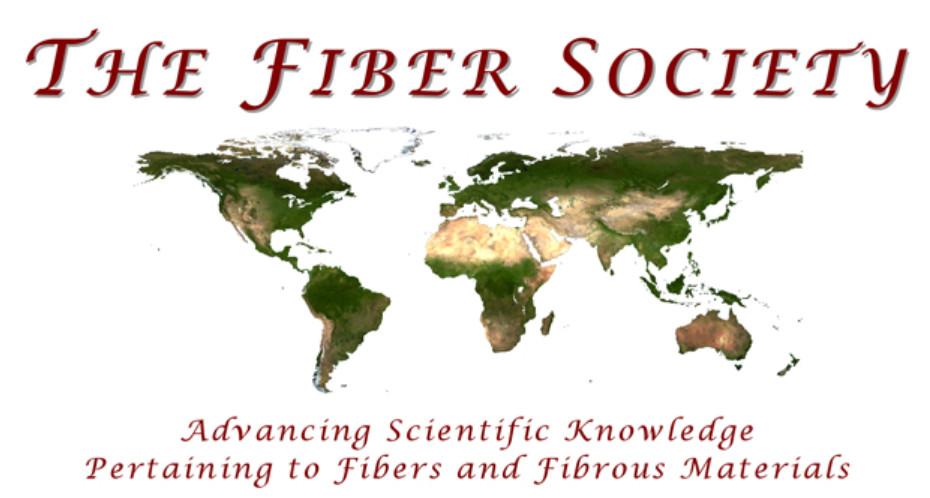 The Department of Materials Engineering at the KU Leuven University, Belgium – host of The Fiber Society’s Spring 2020 Conference – has postponed this years conference on “Fibers For A Greener Society: From Fundamentals To Advanced Applications” to 25-27 May 2021. It has issued the following notification:
The Department of Materials Engineering at the KU Leuven University, Belgium – host of The Fiber Society’s Spring 2020 Conference – has postponed this years conference on “Fibers For A Greener Society: From Fundamentals To Advanced Applications” to 25-27 May 2021. It has issued the following notification:
With deep regret, given the current Coronavirus pandemic affecting us all, The Fiber Society 2020 Spring Conference planned for KU Leuven in Belgium is postponed to 25-27 May 2021. Tentative plans are to reschedule that meeting for Spring 2021, subject to further modification as the pandemic evolves. We will provide additional information as it becomes available. The Officers, Governing Council, and the KU Leuven conference organizers send best wishes to The Fiber Society's friends and colleagues around the world as we navigate these unprecedented times together. Please stay safe and keep well!
The Fiber Society is a not-for-profit scientific association founded in 1941 in the USA. The conference is organized twice a year, in Fall in the US and in Spring, either in Europe or Asia. The topics of the conference are open to all types of fibers, from the nanoscale to the macroscale, from fundamental to applied research targeting eclectic applications.
The Society’s twice-yearly conferences attract an international group of individuals representing all areas of fiber science, gathered to exchange new ideas and discoveries through oral talks, poster presentations, exhibits, and social engagements.
The Organizing Committee, as per the original announcement is as follows:
- David Seveno (KU Leuven)
- Aart Willem Van Vuure (KU Leuven)
- Carlos Fuentes (KU Leuven)
- Pamela Gabriel (Fiber Society)
- Ian Hardin (University of Georgia)
- Janice Gerde (US Customs and Border Protection)
- Karen De Clerck (UGent)
- Wim Deferme (UHasselt)
- Jürgen Van Erps (VUB)
- Sofie Cambré (UAntwerpen)
- Joël De Coninck (UMons)
- Christine Dupont (UCLouvain)
Inquiries about the conference should be made to Pamela Gabriel via email.
The members of the Scientific Committee for the Conference are:
- Vincent Placet (Université de Besançon)
- Malgorzata Zimniewska (Institute of natural fibres & medicinal plants)
- Alessandro Pegoretti (University of Trento)
- Ulrich Hirn (Graz University of Technology)
- Amit Rawal (IIT Delhi)
- Jiří Militký (Technical University of Liberec)
- Christina Scheffler (Leibniz-IPF)
- Soumitra Satapathi (IIT Roorkee)
- Naveen Reddy (UHasselt)
- Francisco Lopez-Molina (KU Leuven)
- James Thomason (University of Strathclyde)
- Yoshioka Kenichi (Toray)
- Rupert Kargl (University of Maribor)
- Artem Kulachenko (KTH)
- Wei Guo (North Carolina State University)
- René Rossi, Ex Officio (Empa—2019 President, The Fiber Society)
- Maria Seo (KU Leuven)
- Bernard Paquet (Centexbel)
- José Bico (ESPCI)
- Frank Ko (University of Bristish Columbia)
- Carla Hertleer (SIM-Flanders)
- Lars Berglund (KTH)
- Christophe Caucheteur (UMons)
- Stefan Jockenhövel (AMIBM)
- Takeshi Kikutani, Ex Officio (Tokyo Institute of Technology—2020 President, The Fiber Society)
Please keep a watch on the notice board of the Department of Materials Engineering for any further change in the program.
About the Department of Materials Engineering
The Department of Materials Engineering (MTM) is a part of the Faculty of Engineering Science, which in turn is part of the Science, Engineering and Technology Group. MTM’s mission is to take care of education , perform research in the field of materials science and its industrial applications, and to provide services.
Materials Engineering Department Chair prof. dr. ir. Martine Wevers World ranking: 45 Number of staff: 214 MTM women: 28% MTM men: 72%
Materials Engineering KU Leuven
Materials For A Better World
The new materials and materials production and transformation processes we develop contribute to tomorrow’s technologies and applications.
- Efficient and environmental friendly recycling processes
- New alloys to replace lead-containing components
- Biodegradable composites
- Nano-engineered composites
- Hybride composites
- Electrical conductive ceramic composites
- Materials for supercapacitors
- Printed electronic materials for energy harvesting and energy storage
- Bone scaffolds for a faster recovery of human tissue
- Ceramic gradient materials for dental restoration and hip implants
- Ultra strong steels
- Materials resistant to corrosion of liquid metals
- Wear resistant hard metal and cermet tool materials
- Radiation resistant materials
- Materials for extreme conditions (temperature, corrosion, oxidation, …)
- New alloys for additive production techniques
- Additive processing of ceramic components and composites
- Geopolymer building materials
- Sensors based on functionalized materials
- Smart and multifunctional materials

